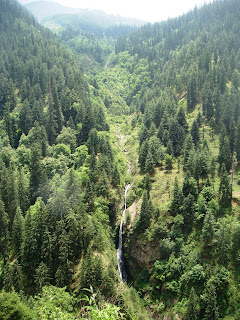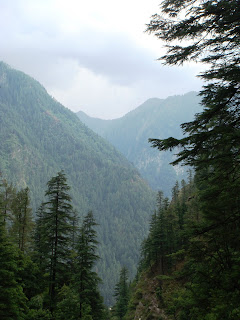
My first ever book by Somerset Maugham. And I fell in love with the author.
The story is about a painter called Charles Strickland. And it isn’t quite a story. It’s character sketching.
What could possibly claim to make it a story however, is the extraordinary nature of the turn of events or the unexpectedness of the turn of events that eventually turned a most common man to a celebrated painter. (Please read the word extraordinary as out of ordinary or even abnormal).
Charles Strickland, a very common man whom no one would expect to notice anything in, one fine day, abandons all - family, hometown, job and leaves to Paris where he begins painting. He lives in a miserable condition but goes about his living without any complaint or expectation.
He later moves to an island where he paints some more, gets married, creates some masterpieces and dies of leprosy.
Since the protagonist was a man of idiosyncrasies or eccentricities, and chose to live in oblivion and showed no interest in anything or anyone particular, it can be said that the author’s undertaking to sketch his character was an impossible task.
The author has tried to construct the story of the man from episodes here and episodes there, glimpses here and glimpses there. Where the links are broken, the author tries to help with educated guesses that stem from his own understanding of man and life.
The book, in summary is the incomplete story of Charles Strickland. But it is so well written, full of character sketching, imagery and meaningful insights that it can be the work, only of a genius.
The book also has interesting incidents related to people the author knew in common with Strickland.
If you want to know how banality can be made interesting by way of narration, you should read this book. If you want to understand what ‘bringing out the beauty of the language’ is, then you should read this book.
The book is full of meaningful insights into the subtle workings of human psychology.
The faculty for myth is innate in the human race. It seizes with avidity upon any incidents, surprising or mysterious, in the career of those who have at all distinguished themselves from their fellows and invents a legend to which it then attaches a fanatical belief. It is the protest of romance against the commonplace of life.
I loved the last line.
It is not true that suffering ennobles the character; happiness does that sometimes, but suffering, for the most part, makes men petty and vindictive.
I agree. Suffering can make people cynical and bitter.
Everyone likes power. I can’t imagine a more wonderful exercise of it than to move the souls of men to pity or terror.
What I had taken for love was no more than the feminine response to caresses and comfort which in the minds of most women passes for it. It is a passive feeling capable of being roused for any object, as the vine can grow on any tree; and the wisdom of the world recognizes it’s strength when it urges a girl to marry the man who wants her with the assurance that love will follow. Its an emotion made up of the satisfaction in security, pride of property, the pleasure of being desired, the gratification of a household, and it is only by an amiable vanity that women ascribe to it, spiritual value. It is an emotion which is defenseless against passion…
Isn’t this the founding principle of the institution of arranged marriage? How beautifully, completely and vividly the author has explained this!
She may have had no particular feeling for him but succumbed to his wish from propinquity or idleness, to find then that she was powerless in a snare of her own contriving.
It is hard that a man’s exterior should tally so little sometimes with his soul.
He was always blundering. He had a real feeling for what was beautiful and the capacity to create only what was commonplace.
People talk of beauty lightly and having no feeling for words they use that one carelessly so that it loses its force.; and the thing it stands for sharing its name with a hundred trivial objects is deprived of dignity. They call beautiful a dress, a dog, a sermon and when they are face to face with Beauty, they cannot recognize it. The false emphasis with which they try to deck their worthless thoughts blunts their susceptibilities. Like the charlatan who counterfeits a spiritual force he has sometimes felt, they lose the power they have abused.
I have always felt this very strongly. I use my adjectives carefully and advise friends to do so. I have in the recent times felt particularly annoyed with certain useless adjectives having become popular. “Cool”, “Awesome”! everything is cool. Everything is awesome.
What a lousy way to cover up your poor vocabulary!
Until long habit has blunted the sensibility, there is something disconcerting to the writer in the instinct which causes him to take an interest in the singularities of human nature so absorbing that his moral sense is powerless against it. He recognizes in himself an artistic satisfaction in the contemplation of evil which a little startles him; but sincerity forces him to confess that the disapproval he feels for certain actions is not nearly so strong as his curiosity in their reasons. The character of a scoundrel, logical and complete, has a fascination for his creator which an outrage to law and order. I expect that Shakespeare devised Iago with a gusto which he never knew when, weaving moon beams with his fancy, he imagined Desdemona. It may be that in his rogues, the writer gratifies instincts deep rooted in him, which the manners and customs of a civilized world have forced back to the mysterious recesses of the subconscious. In giving to the character of his invention flesh and bones he is giving life to that part of himself which finds no other means of expression. His satisfaction is a sense of liberation.
Wow! I never thought about this one.
Unconsciously perhaps we treasure the power we have over people by their regard for our opinion of them, and we hate those upon whom we have no such influence. It is the bitterest wound to human pride.
I wander along trails that others have blazed for me.
Some men are born out of their due place. Accident has cast them amid certain surroundings, but they have always, a nostalgia for a home they know not. They are strangers in their birthplace, and the leafy lanes they have known from childhood or the populous streets in which they have played remain but a place of passage. They may spend their whole lives aliens among their kindred and remain aloof among the only scenes they have ever known. Perhaps it is this sense of strangeness that sends men far and wide in the search for something permanent to which they may attach themselves. Perhaps some deep rooted atavism urges the wanderer back to lands which his ancestors left in the dim beginnings of history. Sometimes, a man hits upon a place to which he mysteriously feels that he belongs. Here is the home he sought and he will settle amid scenes that he has never seen before among men he has never known as though they were familiar to him from his birth. Here at last, he finds rest.
The mills of God grind slowly but they grind exceedingly small.
Other lines I noted down….
Eccentricity is necessity to becoming great.
On the streets of Paris….clerks, shopgirls, and members, male and female of the professions which make their profit of the frailties of mankind…
I wanted to fight with him… But, his cordial agreement with all I said cut the ground from under my feet…
A nonchalant sarcasm
On the other hand,…………………
The book could have been slimmer by 40 pages (which are a painful read) but for the beauty of the language the author brings about in those 40 pages, as he also does with the remaining 120 pages.
Character sketching seemed kind of inadequate at places and not without instances of incongruence. At one point he describes a man as nonchalant, detached and very commonplace. At a different point he uses adjectives like ‘violent’ while referring to the same man and he uses no example to illustrate or justify the use of that adjective. I became confused. In certain places, character sketching seemed inadequate and ineffectual.
While a few characters in the beginning of the book seem inadequately sketched, most of them are very well sketched. You can ‘see’ them.
The absence of a plot or a story notwithstanding, you don’t tire of reading it and the experience of reading it is not dissatisfying. It is a pleasure to read each sentence that brings out the beauty of the language.
Even if the whole book were about nothing, I would still read it merely for it’s literary splendor.


























































